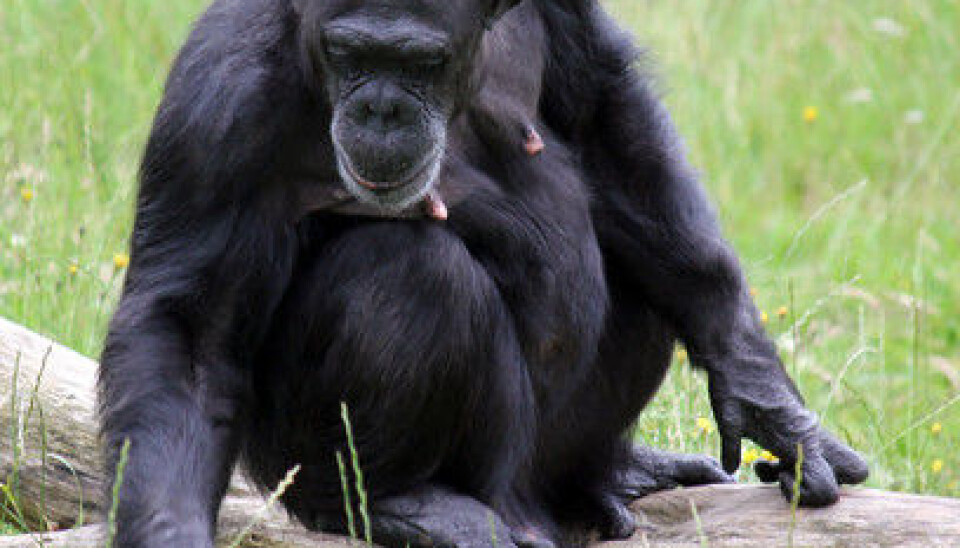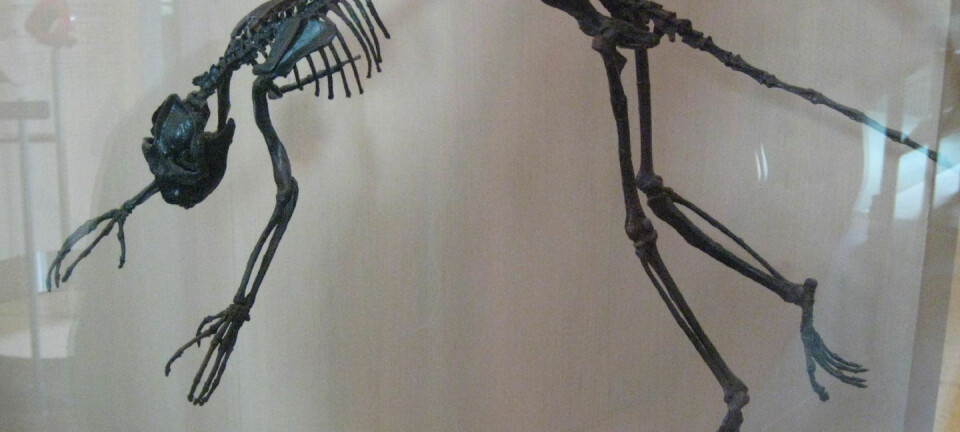
Chimpanzees have the X factor
New research reveals how natural selection has affected the evolution of chimpanzees, and perhaps also humans. The X chromosome probably holds the answer.
The X chromosome of chimpanzees has had special significance for the evolution of the species. Almost a third of all mutations on this chromosome seem to have occurred through positive selection, since the mutations have proven beneficial.
By contrast, many more changes have occurred on all the other chromosomes, but relatively few have produced any benefit.
So shows new research jointly conducted by Aarhus University, Copenhagen Zoo, the University of Copenhagen and Beijing Genomics Institute in China.
The new findings suggest that the same process may have occurred in humans. If so, this can help create new understanding of our own evolution.
Our results show that selection has a stronger effect on the X chromosome than on the other chromosomes.
"Our results show that selection has a stronger effect on the X chromosome than on the other chromosomes," says Associate Professor Thomas Mailund of the Bioinformatics Research Centre at Aarhus University. "This tells us that most mutations are recessive, in other words they only express themselves if they are present on both chromosomes."
"So it makes sense that we see most selective mutations, both positive and negative, on the X chromosome," says the professor.
Males reveal the mutations
If the mutation is recessive and is only on one chromosome, the other chromosome will maintain the gene's normal function and the mutation would not be expressed.
But if the mutation is on the X chromosome, it will be expressed in all males carrying the mutation, since males have only one X chromosome.
A beneficial mutation will give an immediate advantage to the male and increase his chances of passing the mutation to his offspring. Conversely, a deleterious mutation will give the male a disadvantage and so would quickly disappear from the species.
"If mutations are recessive, they will be more strongly expressed if they are on the X chromosome. So it can be expected that more of the beneficial mutations will be seen on the X chromosome and not on the other chromosomes. That is what our observations have shown. Our results support the hypothesis of recessive mutations," explains Mailund.
Looking for changing genes
The researchers who made the new discovery studied practically all the genes from twelve chimpanzees.
They studied all the changes in the genes since chimpanzees and humans diverged in their evolution, and then compared the mutations that have had a beneficial evolutionary effect with those changes that have had no significant effect.
In overall terms, most mutations are either inconsequential or deleterious to the genes and do not give the species a benefit. But occasionally mutations occur that benefit the species, and these spread quickly in the population.
The researchers discovered that from the time chimpanzees diverged from humans in their evolution, a third of the changes to the X chromosome were the result of positive selection. The number of changes on the other chromosomes that expressed positive selection was virtually zero.
X chromosome reveals the past
If a mutation occurs that has no real significance for individual survival, there is little likelihood that the mutation will spread to the whole species, and if it does, it will take a very long time.
There is also little likelihood that a beneficial mutation will spread throughout the species. But once it does take hold in the species, it will quickly become common in all individuals.
This is why the X chromosome has had such a significant effect on how species have evolved. Mutations on the X chromosome become evident much earlier, since they are expressed directly in all males, while mutations on all the other chromosomes take longer before they become a feature of all the individuals in a population.
So the overall effect is that mutations on the X chromosome will more quickly become a part of the whole population than mutations on the other chromosomes. And if at the same time it is a beneficial mutation, it will occur even faster.
Stronger selection on X chromosome
Since 2006, researchers have shown that the X chromosome of humans and chimpanzees are more closely related than the other chromosomes. This means that the journey back in time to find the common ancestor is shorter for the X chromosome than for the other chromosomes.
The new results could help explain this.
"Everything points to selection being a lot stronger on the X chromosome than on other chromosomes," says Mailund.
Research easier with chimpanzees
Does the same apply to humans? Probably.
But the researchers chose to conduct their research on chimpanzees since they are a lot easier to study from a demographic perspective.
Demographic effects such as population behaviour, population growth or migration between populations blur the genetic signals that are used to recognise selection.
The human being is a young species which has quickly spread around the globe, soared in numbers and exchanged genes in all directions. Without knowing the exact demographic history, it cannot be said with certainty whether the signals are caused by selection or demography.
Chimpanzees on the other hand have had a relatively stable existence in Central Africa for hundreds of thousands of years. So it is easier to find simple demographic changes and separate them from selection.
"By using chimpanzees we can identify the strength of natural selection, but as far as we know, there is no reason to believe that it functions differently for humans," says Mailund.
Read the article in Danish at Videnskab.dk
Translated by: Nigel Mander






